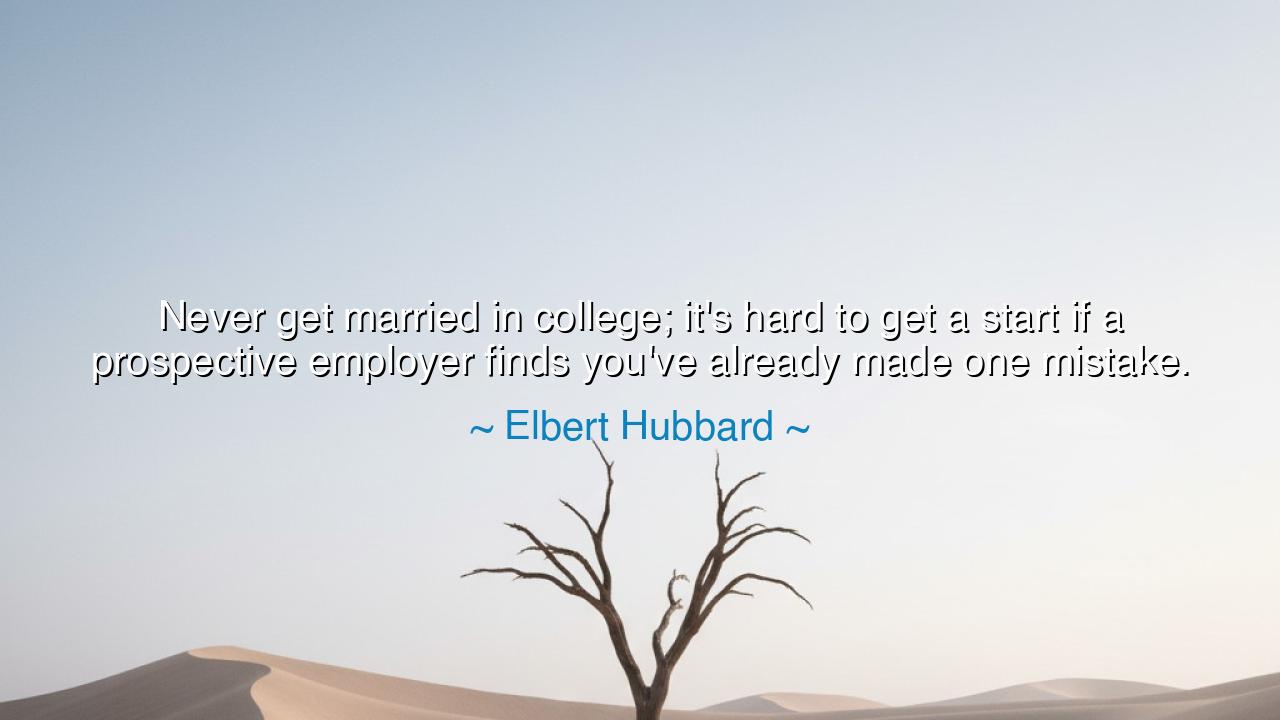
Never get married in college; it's hard to get a start if a
Never get married in college; it's hard to get a start if a prospective employer finds you've already made one mistake.






The American writer and philosopher Elbert Hubbard, known for his wit, sharp tongue, and unorthodox wisdom, once declared: “Never get married in college; it’s hard to get a start if a prospective employer finds you’ve already made one mistake.” At first, his words seem cruel and mocking, as though marriage were nothing but folly. Yet beneath the jest lies a warning wrapped in humor, a satire aimed not only at youthful haste but also at the harsh judgments of society. Hubbard, who often cloaked his truths in irony, reminds us here that what we call mistakes are often the results of inexperience, and that the world, unforgiving in its gaze, will use them as marks against us.
The quote is born from the late 19th and early 20th century, an age when men and women alike were seeking new freedoms in education and vocation. Marriage in youth was seen by many as noble, even expected, yet Hubbard points to the danger: to bind oneself too early, before the soul has found its place in the world, is to risk entanglement in burdens that stifle growth. Employers, he suggests with biting wit, would see such a choice as proof of rashness, a sign that the young scholar already bore the weight of adult responsibility before even beginning a career. Thus marriage, in this context, becomes a symbol of haste, a premature commitment in a time meant for preparation.
We may look to history for examples of those who ignored such advice. Consider the life of Percy Bysshe Shelley, the English poet. While still a youth at Oxford, filled with dreams and rebellion, he hastily married Harriet Westbrook. The union, made in passion rather than wisdom, soon became a chain around him. His restless spirit and unsteady path brought suffering to both, and the marriage collapsed in tragedy. Though Shelley’s genius endured, the burden of his early mistake shadowed him. His story reminds us that Hubbard’s quip, though playful, points toward a truth: timing matters in love as well as in labor.
Yet Hubbard’s words are not only caution but satire. By calling marriage itself a “mistake,” he exposes the cynicism of society, where employers and institutions often judge personal choices with little compassion. A young person who marries is not necessarily doomed, nor have they truly erred—but in a world ruled by suspicion and prejudice, even innocent decisions can be seen as signs of weakness. Hubbard warns us, therefore, not just of the challenges of early marriage, but of the harshness of human judgment, which so easily condemns without understanding.
The deeper meaning is this: life’s beginnings are fragile, and one must step wisely. Youth should be given space to explore, to learn, to fail in small ways before making great commitments. Marriage, a bond that demands patience, endurance, and maturity, may falter if entered without the foundation of experience. To rush toward it in the days of college, when character is still unformed and ambitions still uncertain, is to risk building on sand. Hubbard’s humor masks a plea for prudence: let the house of life be built on stone before adding the roof of responsibility.
But let us not take his jest too literally. Many have married young and thrived, forging love that endured hardship. The true danger lies not in the age of marriage but in the readiness of the soul. The wise must discern whether they are prepared, whether love has depth beyond infatuation, whether they can balance ambition with devotion. Hubbard’s warning should not banish youthful love, but it should teach us to weigh carefully the choices that shape our destiny.
The lesson for us, then, is clear. Do not let haste guide you in matters of life’s great importance. Build your foundation first—your knowledge, your craft, your inner strength—before binding yourself to another’s journey. And remember always that society will judge, often unfairly, so be deliberate in the steps you take. If you would avoid the label of “mistake,” let your choices be rooted in wisdom, not impulse.
Practical wisdom flows from this: if you are young, focus first on growth, learning, and the shaping of character. If you are older, and already bound, do not despair of past haste; instead, work tirelessly to transform what others may call a mistake into a triumph. For in truth, no choice is final until you make it so. And thus Hubbard’s jest becomes our counsel: walk carefully, choose wisely, and let no laughter of men dissuade you from the greater work of building a life founded upon strength, patience, and love.






AAdministratorAdministrator
Welcome, honored guests. Please leave a comment, we will respond soon